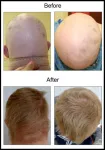(Press-News.org) Scientists from Macquarie University working with Bunuba Indigenous rangers and the Department of Biodiversity, Conservation and Attractions (DBCA) in Western Australia have trialled a new way to protect freshwater crocodiles from deadly invasive cane toads spreading across northern Australia.
Freshwater crocodiles (Crocodylus johnstoni) are a culturally significant animal and part of traditional owners’ Dreamtime stories in the region. The loss of these predators also upsets the delicate balance of local ecosystems.
The group’s research, published in Proceedings of the Royal Society: B on August 14, shows a method to significantly reduce freshwater crocodile death rates in areas where cane toads first invade by teaching the crocodiles to link cane toads with a bout of food poisoning.
Lead author Dr Georgia Ward-Fear from Macquarie University’s School of Natural Sciences and her co-author, Professor Rick Shine, documented the successful trial of a behavioural ecology method called conditioned taste aversion (CTA).
Bunuba ranger coordinator Paul Bin Busu and rangers Kristen Andrews and Karl Bin Busu reported noticeable changes in crocodile behaviours during the program.
Following the successful conservation intervention, Sara McAllister from DBCA’s state cane toad program can plan future interventions in areas with similar ecology.
Trail of destruction
Since cane toads were imported from South America in the 1930s, they have left a trail of native animal casualties across northern Australia, wiping out local predator species such as goannas, snakes and freshwater crocodiles.
These animals are important foods for traditional owners and play a vital role in their environments – but have no innate defence from the poisonous toads.
“Losing freshwater crocodiles to cane toads will mean that bottom feeders in our rivers will eat all the bait such as judembah (cherrabin, a large freshwater prawn) and lardy (boney bream, an estuarine fish), leaving no fish for the barramundi and stingray to eat,” says Ranger coordinator Paul Bin Busu.
The study took place mainly in May to October – the dry season in Australia’s tropical north, when river systems can shrivel into a series of isolated pools, supporting far fewer of the prawns, fish and amphibians making up a freshwater crocodile’s normal aquatic diet, yet higher densities of the crocodiles
“Freshwater crocs can be heavily impacted astheir river systems dry out during the late dry season,” says Dr Ward-Fear. “They end up congregating in large numbers with very little food, and as toads begin to use these waterbodies for rehydration, the two come into contact and we see large numbers of crocodile deaths over a few months.”
How they did it
Between 2019 and 2022, Dr Ward-Fear and Professor Shine worked with local rangers and DBCA staff to deploy doctored cane toad carcasses across four large gorge systems in the Kimberley region of north-western Australia.
Bunuba and DBCA collected hundreds of cane toads, removing the poisonous parts and injecting the toad bodies with enough of a nausea-inducing chemical that freshwater crocodiles eating the bait would feel temporarily sick (but wouldn’t die).
Control baits of chicken meat – with no nausea-inducing additives – were used to monitor the effectiveness of conditioned taste aversion training.
“Being a part of the program on the ground doing the job was really good,” says Paul Bin Busu, whose team of rangers set up hundreds of bait stations over the river banks, using canoes to hang and replace fresh baits and monitor the responses of crocodiles
Getting Results
“The first three days we noticed the crocodiles were taking the cane toads then they would go away.. Then we noticed they would smell the cane toad before eating, and on the lastday we noticed that it was mostly the chicken necks getting eaten,” he says.
Using nocturnal ‘spotlighting’ surveys and remotely triggered wildlife cameras to monitor crocodile and toad numbers, the team found areas where taste aversion trials took place had greatly-reduced crocodile mortality rates compared to unbaited control sites.
“Our baiting completely prevented deaths in areas where cane toads were arriving and decreased deaths by 95% in areas where toads had been for a couple of years. Effects which continued in the years following.” said Dr. Ward-Fear.
“These are really exciting results because it provides land managers with tools to use ahead of the invasion, but also behind the invasion front” says Sara McAllister from DBCA. “Together we’ve shown that collaborations between academics, indigenous rangers and land management agencies can be really effective for conservation science”
“After the program we see that the populations of the crocodiles are coming back, which is a good thing to see,” says Paul Bin Busu.
The team has previously used a similar technique, this time with less-toxic small cane toads, to protect yellow monitor lizards from the invasive predators.
Senior author Professor Rick Shine says the study details the successful use of conditioned taste aversion as a behavioural ecology technique.
“At a time when globalisation has massively increased the spread of invasive species, behavioural ecology can protect vulnerable ecosystems,” Professor Shine says.
END
Funding:
This research was funded by the Australian Research Council (LP170100013)
The Cane Toad Coalition is funded by:
WA Department of Biodiversity Conservation and Attractions (DBCA), Australian Wildlife Conservancy, World Wide Fund for Nature Australia, Kimberley Land Council, Rangelands Natural Resource Management, Dunkeld Pastoral and Matsos Brewery.
END
Crook croc Cuisine: Could a bad dinner save a species?
Scientists cook up a plan to save freshwater crocodiles from toxic cane toads
2024-08-14
ELSE PRESS RELEASES FROM THIS DATE:
Orlando Health first in the world to use Abbott's new blood test for traumatic brain injuries
2024-08-14
Orlando, FL (Aug. 13, 2024) – Orlando Health Orlando Regional Medical Center (ORMC) is the first hospital in the world to use a new, groundbreaking blood test to help assess patients with suspected mild traumatic brain injuries (TBIs), or concussions. The rapid TBI blood test provides results in just 15 minutes and was developed by Abbott, in collaboration with the Department of Defense, and built upon innovative research that Orlando Health’s Dr. Linda Papa and others helped pioneer over 20 years ago.
According to the National Institutes of Health, traumatic brain injury from accidents or sports is a leading cause of death and disability in ...
Swipe up! Health apps deliver real results en masse
2024-08-14
In a new study, researchers synthesised data from 206,873 people across 47 studies, finding that digital health tools – like mobile apps, websites, and text messages – can significantly improve health and wellbeing by keeping you active, boosting steps, and improving your diet and sleep.
Specifically, electronic and mobile health interventions can help people achieve:
1329 more steps / day
55 minutes more moderate-to-vigorous exercise / week
45 minutes more overall physical activity / week
7 hours less sedentary behaviour / week
103 fewer calories consumed / day
20% more fruits and vegetables consumed / day
5.5 grams less saturated fat consumed / day
1.9 ...
Climate change raised the odds of unprecedented wildfires in 2023-24
2024-08-14
Unprecedented wildfires in Canada and parts of Amazonia last year were at least three times more likely due to climate change and contributed to high levels of CO2 emissions from burning globally, according to the first edition of a new systematic annual review.
The State of Wildfires report takes stock of extreme wildfires of the 2023-2024 fire season (March 2023-February 2024), explains their causes, and assesses whether events could have been predicted. It also evaluates how the risk of similar events ...
Exciting advance in stem cell therapy
2024-08-13
A new technique developed by McGill researchers for mechanically manipulating stem cells could lead to new stem cell treatments, which have yet to fulfill their therapeutic potential.
Stem cell therapy has been heralded as a new way to treat many diseases, ranging from multiple sclerosis, Alzheimer’s and glaucoma to Type 1 diabetes. The anticipated advances have yet to materialize in part because it has proved much more difficult than originally thought to control the types of cells that develop from stem cells.
“The great strength of stem cells is their ability to adapt to the body, replicate and transform themselves into other kinds of cells, whether ...
New research explores the urea cycle’s strong connection to fatty liver disease
2024-08-13
INDIANAPOLIS — An Indiana University School of Medicine physician scientist is making strides in understanding the molecular origins of fatty liver disease, a leading cause of liver failure in the United States. By identifying the critical role the urea cycle plays in its development, his findings could pave the way for new medications to treat this currently incurable disease.
In a study recently published in Cell Metabolism, Brian DeBosch, MD, PhD, professor of pediatrics at the IU School of Medicine and the study’s corresponding author, uncovered ...
Two new studies show how immunotherapies collaborate to boost T cell responses in melanoma
2024-08-13
Two studies published in the latest issue of the journal Cell by University of Pittsburgh researchers uncover how immunotherapies targeting the immune checkpoints PD1 and LAG3 work together to activate immune responses. The findings shed light on why combination therapies targeting both checkpoints can improve outcomes for melanoma patients compared to monotherapies targeting only PD1.
Using data from a human clinical trial and animal models, the researchers investigated responses of tumor-killing CD8+ T cells. During extended battles with cancer, immune checkpoints accumulate on the surface of T cells, acting like brakes on ...
Less sleep and later bedtime in childhood linked to future substance use
2024-08-13
UNIVERSITY PARK, Pa. — A good night’s sleep is essential for children’s health and development, but childhood sleep patterns may also be linked to future substance use. A new study, led by a team of Penn State researchers, found that adolescents were more likely to have consumed alcohol or tried marijuana by age 15 if they went to bed later and slept fewer hours during childhood and adolescence. The team published their findings in Annals of Epidemiology.
“The study suggests that there might be some critical ages when sleep can be a target for intervention,” said Anne-Marie Chang, associate professor of ...
C-Path’s TRxA announces $250,000 grant for drug development project on antibiotic-resistant gram-negative bacteria
2024-08-13
TUCSON, Ariz. August 13, 2024– Critical Path Institute’s (C-Path) Translational Therapeutics Accelerator (TRxA) announced today that Kenneth Keiler, Ph.D., Professor of Molecular Biosciences at the University of Texas at Austin, has been awarded a research grant for his innovative project titled “Inhibitors of the Gram-negative Cell Envelope Stress Response as Anti-Infectives and Antibiotics.” This funding will support Dr. Keiler’s original approach to addressing the critical issue ...
Crnic Institute clinical trial shows JAK inhibitor improves multiple autoimmune conditions in patients with Down syndrome
2024-08-13
A new study published in eLIFE by researchers from the Linda Crnic Institute for Down Syndrome (Crnic Institute) at the University of Colorado Anschutz Medical Campus reports the initial results of a first-in-kind clinical trial testing the safety and efficacy of a JAK inhibitor to decrease the burden of autoimmune conditions in people with Down syndrome. The clinical trial, which is funded by the National Institute of Arthritis and Musculoskeletal and Skin Diseases, is part of a portfolio of new clinical trials supported by the National Institutes of Health INCLUDE Project.
Drawing upon their 2016 discovery that the interferon ...
New study looks at drug exposures of COVID-19 therapy for pregnant people
2024-08-13
A new study provides important insights into the pharmacokinetics and safety of intravenous remdesivir in treating the SARS-CoV-2 coronavirus in pregnant women.
Remdesivir is an antiviral medication and is used to treat certain patients with COVID-19 who are either hospitalized or have mild-to-moderate symptoms in the outpatient setting and are at high risk of severe disease.
The study, published in the Journal of Infectious Diseases, is the first pharmacokinetic study to be published on a COVID-19 therapy in pregnant women. Pharmacokinetic studies ...
LAST 30 PRESS RELEASES:
Study reveals insights about brain regions linked to OCD, informing potential treatments
Does ocean saltiness influence El Niño?
2026 Young Investigators: ONR celebrates new talent tackling warfighter challenges
Genetics help explain who gets the ‘telltale tingle’ from music, art and literature
Many Americans misunderstand medical aid in dying laws
Researchers publish landmark infectious disease study in ‘Science’
New NSF award supports innovative role-playing game approach to strengthening research security in academia
Kumar named to ACMA Emerging Leaders Program for 2026
AI language models could transform aquatic environmental risk assessment
New isotope tools reveal hidden pathways reshaping the global nitrogen cycle
Study reveals how antibiotic structure controls removal from water using biochar
Why chronic pain lasts longer in women: Immune cells offer clues
Toxic exposure creates epigenetic disease risk over 20 generations
More time spent on social media linked to steroid use intentions among boys and men
New study suggests a “kick it while it’s down” approach to cancer treatment could improve cure rates
Milken Institute, Ann Theodore Foundation launch new grant to support clinical trial for potential sarcoidosis treatment
New strategies boost effectiveness of CAR-NK therapy against cancer
Study: Adolescent cannabis use linked to doubling risk of psychotic and bipolar disorders
Invisible harms: drug-related deaths spike after hurricanes and tropical storms
Adolescent cannabis use and risk of psychotic, bipolar, depressive, and anxiety disorders
Anxiety, depression, and care barriers in adults with intellectual and developmental disabilities
Study: Anxiety, gloom often accompany intellectual deficits
Massage Therapy Foundation awards $300,000 research grant to the University of Denver
Gastrointestinal toxicity linked to targeted cancer therapies in the United States
Countdown to the Bial Award in Biomedicine 2025
Blood marker from dementia research could help track aging across the animal world
Birds change altitude to survive epic journeys across deserts and seas
Here's why you need a backup for the map on your phone
ACS Central Science | Researchers from Insilico Medicine and Lilly publish foundational vision for fully autonomous “Prompt-to-Drug” pharmaceutical R&D
Increasing the number of coronary interventions in patients with acute myocardial infarction does not appear to reduce death rates
[Press-News.org] Crook croc Cuisine: Could a bad dinner save a species?Scientists cook up a plan to save freshwater crocodiles from toxic cane toads



